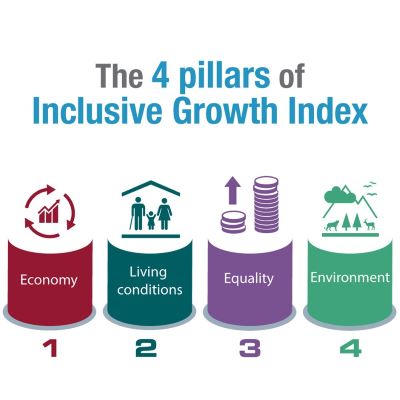Context:
● The annual gathering of the World Economic Forum (WEF) has become a stage where economic ambitions and forecasts are articulated, and the media eagerly relays these messages to the public.
● India, in particular, has been a subject of optimistic predictions regarding its economic trajectory. Leaders, from the Prime Minister to Chief Ministers of various states, have set ambitious targets, envisioning a massive expansion of the nation's economy.
● The aspiration to reach a $5 trillion economy by 2024, as articulated by Prime Minister Narendra Modi, has been echoed and amplified by others, signaling a collective commitment to prioritizing economic growth as a national objective.
● However, a critical examination of this growth-centric approach reveals potential pitfalls, raising questions about the impact of such growth mania on the societal fabric.
Growth and Inequality:
While economic growth is a legitimate and necessary aspiration for a country like India, where a significant portion of the population struggles to achieve a reasonable standard of living, the unchecked pursuit of growth may not necessarily lead to inclusive development. One striking trend accompanying India's recent economic growth is the simultaneous rise in inequality. This inequality, which has been steadily increasing since the 1980s, has now reached levels that categorize India as "a poor country with an affluent elite," according to leading inequality researchers. This alarming inequality poses a significant threat to the overall well-being of the nation.
The paradoxical nature of this growth becomes evident when examining the impact on the income levels of the poorest segments of society. Despite the impressive economic figures, the benefits of this growth appear to be disproportionately favoring the affluent, leaving the income levels of the poorest relatively unaffected. The widening gap between the rich and the poor is a cause for concern, as it challenges the very essence of a democratic society, which is expected to deliver not just economic prosperity but also social justice.
Unequal Growth in the Workforce:
A closer examination of wage data, particularly rural wage rates published by the Labor Bureau, sheds light on the unequal nature of recent economic growth in India. The data reveal that the real wage rate for agricultural labor has experienced only a mild increase, and even this growth has stagnated in recent years. Significantly, the real wage rate for non-agricultural and construction workers has witnessed a decline over the same period. Given that a substantial percentage of India's workforce is engaged in non-agricultural activities, this decline directly impacts a significant portion of the population.
The absence of growth in real wages for a substantial portion of the workforce challenges the assumption that economic growth automatically translates into improved living standards for all. While the overall economy has witnessed growth, the benefits are not trickling down to the lowest rungs of society. This divergence raises questions about the effectiveness of the current economic policies in addressing the root causes of poverty and inequality.
Inequality's Social and Political Ramifications:
The implications of growing inequality extend beyond economic concerns. Unequal societies, as extensively documented, are susceptible to a range of social pathologies, including increased violence, disease, and mental health disorders. The creation of gated communities by the affluent, symbolizing a need to insulate themselves from the societal challenges, reflects the severity of these pathologies. Furthermore, inequality hampers collective action, hindering the ability of diverse groups to collaborate on common goals.
Consider the challenge of achieving total sanitation, exemplified by the Swachh Bharat Mission. The disparity in priorities between the rich, who seek clean public spaces, and the poor, whose basic needs remain unmet, underscores the difficulties in fostering collective action. Inequality poses a barrier to the creation of public goods, ranging from natural capital conservation to waste management and climate change mitigation. Those excluded from economic growth may have less incentive to contribute to these shared objectives, creating obstacles to collective progress.
The Democratic Imperative:
Beyond the instrumental concerns related to social and environmental challenges, the reduction of inequality holds intrinsic value in a democratic society. India, often proudly declared as the world's largest democracy, should uphold the principles of equal opportunity and inclusivity. Historically, economic policy in India has not adequately addressed the glaring inequality of opportunity across its diverse population.
If political leaders remain fixated on maximizing the size of the economy without addressing the underlying inequality, it becomes unlikely that the vast disparities within the nation will ever be bridged. The spirit of democracy demands a more equitable distribution of benefits, ensuring that economic prosperity is not concentrated in the hands of a privileged few. Failure to address this inequality jeopardizes the very foundation of a democratic society, where the well-being of every citizen should be a shared priority.
Conclusion:
In conclusion, the fervor for economic growth that dominates political and economic discourse in India raises important questions about the societal impact of such growth mania. While aspiring to be a significant global economic player is a commendable goal, the unchecked pursuit of growth without addressing the accompanying inequality poses severe risks to the nation. The growing divide between the rich and the poor, coupled with stagnant or declining real wages for a substantial portion of the workforce, challenges the notion that economic growth automatically leads to improved living standards for all.
The social and political ramifications of this inequality are extensive, ranging from increased social pathologies to hindered collective action on shared goals. In a democratic society, where equal opportunity is a fundamental principle, the concentration of economic benefits in the hands of a few is not only detrimental but also contradicts the essence of democracy. It is imperative for India to recalibrate its economic policies, placing a greater emphasis on inclusive growth that addresses the needs of the entire population. Only through a holistic approach that considers both economic prosperity and social justice can India truly fulfill its democratic aspirations.
|
Probable Questions for UPSC Mains Exam
|
Source – The Hindu







